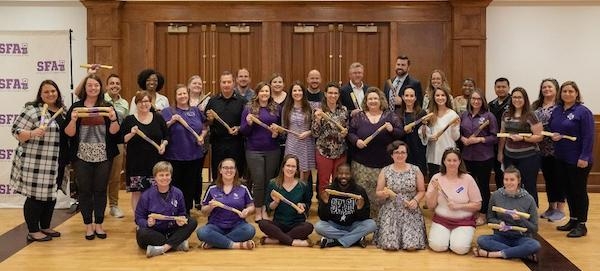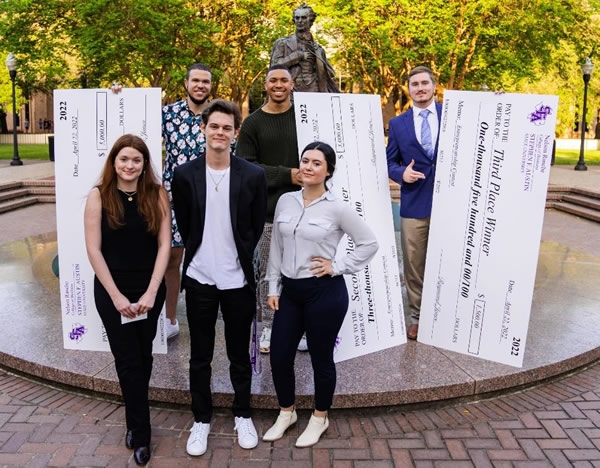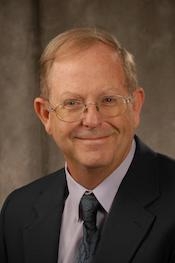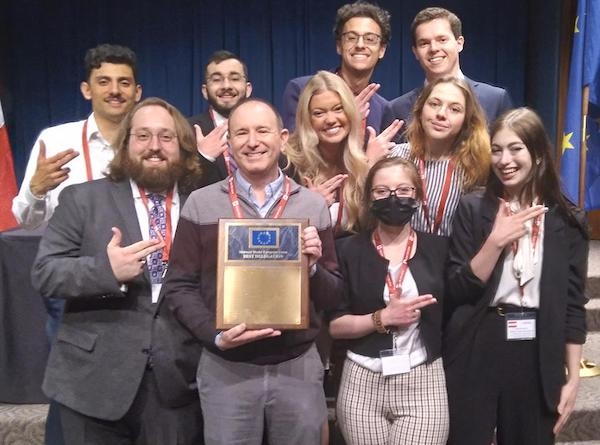SFA University

Stephen F. Austin State University’s Office of Multicultural Affairs recognized 51 graduates of its 2021-22 Diversity and Inclusion Certification Program during a campus luncheon April 26. Graduates were awarded a certificate and a “Diversity Champion” miniature axe handle for completing the program.
May 3, 2022 — Stephen F. Austin State University’s Office of Multicultural Affairs recognized 51 graduates of its Diversity and Inclusion Certification Program during a campus luncheon April 26.
Held annually, the program strives to engage and expose SFA faculty and staff to critical issues in diversity, multicultural education and social justice, as well as facilitate relationship building and learning opportunities across campus.
“This program is important because it lets faculty and staff navigate through and network about crucial issues on a variety of topics pertaining to diversity, equity and inclusion,” said Veronica Beavers, OMA director. “In addition, the program’s graduates and participants have shown a commitment to enhancing their knowledge of DEI on campus. Many students have told me personally that seeing this commitment among faculty and staff is truly appreciated.”
Graduates, who began the program in the fall, were awarded a certificate and a “Diversity Champion” miniature axe handle for completing the program.
Program graduates represented a total of 11 SFA colleges, divisions and offices — three from the College of Liberal and Applied Arts; five from the College of Sciences and Mathematics; four from the Division of Academic Affairs; two from the Division of Finance and Administration; 14 from the Division of Student Affairs; three from the Division of University Marketing Communications; four from Enrollment Management; eight from the James I. Perkins College of Education; six from the Micky Elliott College of Fine Arts; one from the Office of Diversity, Equity and Inclusion; and one from the Office of Environmental Health, Safety and Risk Management.
“Having a large graduation class means a lot,” Beavers said. “In 2019-20 and 2020-21, we averaged about 40 graduates a year, so to see the numbers increase to 51 this year is exciting.”
The free program is open to all SFA faculty and staff. Participants may complete the workshops as a means to earn the certificate or may attend individual workshops based on professional interests or needs. To attain the certificate, participants must attend the foundations workshop and four elective workshops.
OMA plans to offer a Level II certification, along with a similar certification program to community members.
To learn more about OMA, visit sfasu.edu/oma.
May 2, 2022 - The School of Art at Stephen F. Austin State University is expanding its summer art camp to provide more opportunity for a larger demographic.
The SFA Art Academy is now offered for older students as well as elementary age students, according to Dr. Maggie Leysath, professor of art education in the School of Art.
“We are excited to be able to work with secondary-aged artists to provide in-depth artistic training in a studio setting for the first time,” Leysath said.
The elementary art academy is open to ages 5 through 10 who will be in first through sixth grades during the 2022-23 school year. Classes are arranged by approximate age and include drawing, painting, sculpture, ceramics and more.
Classes for elementary students meet from 1 to 4 p.m. Monday through Friday, June 6 through 10 and June 13 through 17, in the Art Building off Wilson Drive. An exhibition of student work will be at 4 p.m. Friday, June 17. All remaining work will be taken home at that time.
The secondary level art academy, which begins June 27 and ends July 1, is for ages 11 through 17 and is for students entering seventh through 12th grades in the 2022-23 school year. Student artists will work with art teachers for a real art studio experience from 9 a.m. until 2 p.m.
“Secondary artists will enjoy a short art lesson each morning and then work on specific skills and artworks they have chosen before we break for lunch at the university cafeteria,” Leysath said. “Afternoon studio time allows students to work independently and with teachers to develop artworks.”
An exhibition of all secondary student artworks will be at 3 p.m. Friday, July 1.
Fees include all art supplies, daily snacks and exhibition expenses. Registration closes on June 3 or when all the spaces are filled. Fees received before June 1 are $200. After June 1, fees are $220. When registering, secondary art academy students should indicate which art mediums in which they are most interested on the form. Registration fees also include lunch costs for the secondary students.
Registration for each academy may be accessed at the School of Art website at art.sfasu.edu under Programs/Community. Space is limited. For more information, contact Leysath at leysathmn@sfasu.edu.

Stephen F. Austin State University’s Rusche College of Business recently held the inaugural Lumberjack Entrepreneurship Competition, inspired by ABC’s TV show “Shark Tank.” The first-place prize of $5,000 went to Reefvita, a sea moss smoothie business developed by Stephan McLawrence, a graduate student in finance from Carriacou, Grenada (back row, left). General business sophomore Quinton Williams of Dallas (back row, middle), earned the $3,000 second-place prize with his apparel business event QC B5 Beauty Pageant, and the $1,500 third-place prize went to entrepreneurship major and senior Ryan Waugh of Austin (back row, right) for his educational video game Play Gov. Other finalists, pictured front row, from left, included Molly Stanfill, Joshua Finklea and Kya Caravella.
April 28, 2022 — Inspired by ABC’s popular television show “Shark Tank” and a recent visit by one of its stars, Daymond John, the Stephen F. Austin State University entrepreneurship program in the Rusche College of Business hosted the inaugural Lumberjack Entrepreneurship Competition April 22.
The competition, which was open to all SFA undergraduate and graduate students, drew 30 entries. They were narrowed down to six for the final competition.
“The competition was really fierce,” said Dr. Raymond Jones, assistant professor of entrepreneurship and strategy at SFA. “We ended up with six finalists when we couldn’t narrow down the entries to five, and we paired each of them with a mentor from the Nacogdoches area to help fine-tune their pitches for the competition.”
Contestants were judged on the market opportunities for their businesses as well as their situational awareness, pitches, business models and go-to-market strategies.
“This competition was outstanding! The final six contestants were all well prepared and did a great job with their pitches,” said Gregory Price, chief financial officer of Decisio Health in Houston, an angel investor and one of the competition judges. “It takes a lot of research, creativity and self-confidence to get up and pitch an idea to a room full of more than 75 people.”
Price said selecting the top three pitches was difficult because each student’s idea was unique and “viable ones that can be carried forward to fruition.”
Other judges for the competition were Taylor Kovar, CEO and founder of Kovar Wealth Management in Lufkin, and Larissa Philpot-Brown, president and CEO of the Nacogdoches Economic Development Corporation.
The first-place prize of $5,000 went to Reefvita, a sea moss smoothie business developed by Stephan McLawrence, a graduate student in finance from Carriacou, Grenada. General business sophomore Quinton Williams of Dallas earned the $3,000 second-place prize with his apparel business event QC B5 Beauty Pageant, and the $1,500 third-place prize went to entrepreneurship major and senior Ryan Waugh of Austin for his educational video game Play Gov.
The three remaining finalists won gift cards: Kya Caravella, marketing junior from Houston, with Talk Box; Joshua Finklea, first-year sports marketing major from Coppell, with Lazer Key; and Molly Stanfill, social work junior from Azle, with Major Decisions.
“I learned so much from this competition, including the dilemmas I may face and other opportunities I can explore in the industry I will be competing in,” said McLawrence, whose pitch touted the health benefits of his smoothies’ main ingredient: the sea moss grown on ropes in the waters surrounding his home island. “Additionally, I received important feedback about my product and its mission from potential customers in attendance.”
McLawrence’s mentor, Sarah Gallander, who graduated from SFA in 1999 with a Bachelor of Science in dietetics and nutritional sciences, focuses on functional nutrition for her clients at The Wellness Matrix.
“Being able to work with a nutritionist and dietician who also runs a successful business gave me insight into the different facets of this particular type of business and helped me win the competition,” McLawrence said. “Mrs. Gallander was an absolute pleasure to work with and is a phenomenal mentor. She devoted a lot of her time and energy into ensuring my pitch was expertly presented, for which I cannot thank her enough.”
Gallander added that the competition showed how people want to invest in people.
“The importance of building your network, beginning with your local community and alumni, is a valuable resource that will lead to future support and success,” she said. “I love seeing the talent SFA has the privilege of grooming.”
Other mentors included Brandon Chambers, owner of Chambers Smokehouse and senior account leader at Etech Global Services; Melody Diven, owner of Clothed in Armor; Dr. Eddy Furniss, physician at Nacogdoches Health Partners; Garth Hinze, president of Ark Pharmacies Inc.; and Dr. Gerardo Saldaña, optometrist at Nacogdoches Eye Associates.
Jones said the competition will be back next year.
“The Lumberjack Entrepreneurship Competition is an outlet for SFA students to nurture and develop their entrepreneurial spirit, as well as for the university to highlight the amazing ideas our students have and the things they are doing,” Jones said. “With the help of so many faculty and community members, these students have learned how to put their ideas into practice in the real world.”
To learn more about the competition and SFA’s entrepreneurship program, visit sfasu.edu/mgtmkt/academics/entrepreneurship or email Jones at raymond.jones@sfasu.edu.
April 28, 2022 — Are you an East Texas region high school science teacher who would like to improve your ability to deliver exciting classroom labs? If so, Stephen F. Austin State University’s summer 2022 workshops can help.
JacksTeach secondary science and mathematics teacher preparation program will offer three, one-week workshops on the SFA campus this summer focused on empowering high school teachers to deliver highly engaging lab experiences for their students. Each workshop is separate and runs from 9am to 3:30pm daily.
Dates and subjects are:
- June 13 through 17 – Biology/Life Sciences
- June 13 through 17 – Physics
- June 27 through July 1 – Chemistry
Workshops will be led by SFA faculty and JacksTeach staff. There is no cost to participate, and continuing professional education credits will be earned. Lunch will be provided.
Teachers who participate in a full-week workshop will receive a $500 stipend and $500 worth of laboratory supplies for their classroom provided by SFA's Center for Applied Rural Research and Innovation.
Lessons will meet Texas Essential Knowledge and Skills, and Next Generation Science Standards. These workshops will provide an excellent opportunity to network with teachers from other districts.
Interested science teachers can apply at gosfa.com/sci-lab-solutions-app. Direct your questions to Dr. Jane Long, JacksTeach director, by email at jacksteach@sfasu.edu or by phone at (936) 468-3960. The deadline to apply is May 2.
 April 27, 2022 — Dr. David Creech, Stephen F. Austin State University professor emeritus of agriculture and director of SFA Gardens, will receive the 2022 Outstanding International Horticulturist Award from the American Society for Horticultural Science, recognizing his decades-long contributions to international horticultural science, education, research and outreach.
April 27, 2022 — Dr. David Creech, Stephen F. Austin State University professor emeritus of agriculture and director of SFA Gardens, will receive the 2022 Outstanding International Horticulturist Award from the American Society for Horticultural Science, recognizing his decades-long contributions to international horticultural science, education, research and outreach.
"Working internationally changes a person,” Creech said. “You suddenly realize there are like-minded souls in every culture — folks who love horticulture, crop production and new ways of doing things. The great joy is developing friendships that last a lifetime.”
Creech’s international research and collaboration spans more than four decades across 10 countries. Examples include kiwifruit research and commercialization with cooperators in South Africa, Italy and New Zealand; blueberry production and urban tree research in China; as well as United States Agency for International Development consultancies for fruit and vegetable production in Guatemala and Pakistan.
“David’s contributions to the field of horticulture, both in the U.S. and abroad, are extensive,” said Dr. Hans Williams, dean of SFA’s Arthur Temple College of Forestry and Agriculture. “His diversity of professional collaborations and research interests have made him a true ambassador for SFA on a global scale.”
Established in 1903, the American Society for Horticultural Science is recognized around the world as one of the most respected and influential professional societies for horticultural scientists. Creech will be honored at the society’s 119th annual conference in Chicago.
Story by Sarah Fuller, outreach coordinator for Stephen F. Austin State University’s Arthur Temple College of Forestry and Agriculture.
April 26, 2022 – The Contemporary Ensemble at Stephen F. Austin State University will present a live-streamed concert at 6pm Friday, April 29, available for viewing on the SFA School of Music YouTube channel.
The Contemporary Ensemble is directed by James Adams, director of the SRT program at SFA. Zach Moore is assistant director.
The performance will feature “Playground” by Bea Miller (featured on the Netflix animated series “Arcane League of Legends”); “Time” by Hans Zimmer (from the movie “Inception”); “Left To Bloom” by Lena Raine (from the original game soundtrack of “Minecraft: Caves and Cliffs”); and “The Pot” by Tool.
Access https://music.sfasu.edu/youtube Friday evening to view the event. For additional information about the SRT program, contact the School of Music at (936) 468-4602.
April 22, 2022 - Graduate-level students in Stephen F. Austin State University’s School of Social Work will present research in correlation with the 21/7 Association’s Youth Engagement Project at 5 p.m. May 5 in the C.L. Simon Recreation Center’s meeting room.
Since February, seven students enrolled in the Social Work Macro Practice course, which centers around working with organizations and communities, have researched the lack of access and participation among youth living in areas surrounding Highways 21 and 7. The students also analyzed the impact of civic engagement on youth connectedness to their local community and developed solutions and recommendations for consideration and implementation.
“This is important because it provides a real-life learning opportunity for the students and shows the impact of assessment and research on individuals, organizations and communities,” said Lenola Wyatt, adjunct professor in the School of Social Work.
The presentation is free and open to the public with the intent to bring city and county officials, local residents and organizations together to consider possible solutions to youth civic engagement and access to city and county recreational services.
The 21/7 Association is made up of concerned citizens working to improve the quality of life for residents within the Highway 21 and 7 geographic boundaries.
For more information on the event, contact Wyatt at wyattlenol@sfasu.edu.
April 12, 2022 — During its quarterly meeting Sunday, the Stephen F. Austin State University Board of Regents appointed Dr. Steve Westbrook to serve as SFA’s interim president until a permanent president assumes the office.
Former SFA president Dr. Scott Gordon and the university mutually agreed it is in the best interest of both parties for the employment relationship to end on Sunday.
Westbrook addressed regents Monday afternoon, citing his long history with and love for the university as assurance that he’s happy to be called upon to help where needed. He is coming out of retirement, he added, to help prepare the university for the upcoming legislative session and to offer guidance during the transition to a new president.
Westbrook, who was first employed by the university in 1981, served as vice president for university affairs from 2007 to 2020 and was the university’s interim president following the death of former president Dr. Baker Pattillo until Gordon’s installation as university president. Since his retirement, Westbrook has continued to serve as an adjunct faculty member and in 2021 was designated by the regents as vice president for university affairs emeritus. He holds bachelor's and master's degrees from SFA and earned a doctorate in higher education leadership from Texas A&M University - Commerce.
During Monday’s continuation of the meeting, the regents also recognized Dr. Steve Taaffe, professor of history, as Regents Scholar. Nominated by SFA faculty members, Taaffe received a $2,000 grant to support his research efforts.
In addition, the regents approved faculty and staff promotions and appointments as well as granted tenure to several faculty members effective fall 2022.
In the Rusche College of Business, regents promoted Dr. Kelly Noe to professor of accounting.
In the James I. Perkins College of Education, regents promoted Dr. Derek Cegelka to associate professor of health science, Dr. Rachel Jumper to associate professor of human sciences, Dr. Sarah Straub to associate professor of education studies, Dr. Nina Ellis-Hervey to professor of human services, Dr. Todd Whitehead to professor of kinesiology, and Dr. Robbie Steward to professor emeritus of human services.
Regents granted tenure to Cegelka; Jumper; Dr. Flóra Faragó, associate professor of human sciences; and Dr. Heather Munro, assistant professor of education studies.
In the Micky Elliott College of Fine Arts, regents promoted James Adams and Dr. Jacob Walburn to associate professors of music and Dr. J.D. Salas to professor of music. Adams and Walburn also were awarded tenure by the regents.
In the Arthur Temple College of Forestry and Agriculture, regents promoted Dr. Stephanie Jones to associate professor of agriculture and awarded her tenure.
In the College of Liberal and Applied Arts, regents promoted Dr. Jose Carbajal to associate professor of social work; Dr. John Pruit to associate professor of anthropology, geography and sociology; Dr. George Day to associate professor of government; and Drs. Dusty Jenkins and Sarah Savoy to professors of psychology.
Regents awarded tenure to Carbajal, Day and Pruit.
In the College of Sciences and Mathematics, regents promoted Drs. James Adams and Christopher Aul to associate professors of physics, engineering and astronomy; Dr. Bidisha Sengupta to associate professor of chemistry and biochemistry; and Drs. Robert Henderson and Jane Long to professors of mathematics and statistics.
Regents awarded tenure to Adams and Aul.
In the Steen Library, Shannon Bowman was promoted to librarian III, and Edward Iglesias was awarded tenure.
Regents approved the following faculty appointments in the Department of Human Services and Educational Leadership: Dr. Maria Betancourt-Smith and Dr. Richard Skuza to visiting assistant professors and Jessica Conn to visiting instructor. In the Department of Kinesiology and Health Science, Robert Clark was appointed visiting assistant professor.
For staff, regents approved the appointments of Amber Mims to program director for the Academic Assistance and Resource Center, Elizabeth Guerra to teacher at SFA Charter School, Jennifer Krause to senior representative in Human Resources, Isabel Rodriguez to area coordinator in Campus Living, Katherine West to compliance specialist in the Title IX office, Gina Oglesbee to vice president for Finance and Administration, and Jane Ann Bridges to interim chief audit executive.
In the Department of Athletics, regents approved the following staff appointments: Dennis Driscoll to associate athletic director of strategic communications; Madison Wilkerson to volleyball assistant coach; and Dylan Belanger, William Bleil, Joe Cauthen and Ikponmwosa Ike Eguae to football assistant coaches.
The regents also approved the following staff changes: Kristin Bangtson from program director of AARC to assistant director of athletics academic services, and Travis Killen from systems manager in Information Technology Services to systems assistant director in ITS.
Lastly, regents approved the retirement of Dr. Shirley Luna, executive director of University Marketing Communications, after 23 years of service.

Stephen F. Austin State University’s Model EU team recently earned Best Delegation at the 2022 Midwest Model European Union competition. Pictured, bottom row from left, are Thomas Martin, Dr. Steven Galatas, Hailee Mouch and Caitlyn Shrewsbury; middle row from left, are Matthew Jennings, Addison Causey, Elizabeth Cockerham and Trinity Altemeyer; and, top row from left, are Jarrett Chancellor and Alexander Gilmour.
April 11, 2022 –– Stephen F. Austin State University’s Model European Union team, which consists of nine political science majors within the Department of Government, earned Best Delegation honors at the Midwest Model European Union Competition.
Hosted by Indiana University, the MMEU competition is the second-oldest intercollegiate simulation of the European Union in North America. The purpose of the competition is to increase awareness and knowledge of the EU, its institutions and processes, according to Dr. Steven Galatas, SFA associate professor of government and Model EU faculty advisor.
“The students gained a deeper appreciation for the EU and its role in the world, as well as the importance of the United States and EU relationship in maintaining peace and stability in Europe and globally,” Galatas said.
SFA’s team represented Austria during the competition. Additionally, SFA was asked to assist the University of North Carolina and Florida International University teams who represented Sweden and Belgium, respectively.
The students received their country assignment through a lottery system. The team met regularly beginning in January to review EU legislature processes and research the country’s positions on important or critical issues, including COVID-19 and the ongoing Russia-Ukraine war.
Matthew Jennings, who’s role was foreign affairs minister in Austria, and Thomas Martin, who served as chancellor of Austria, each received first place in the competition. Caitlyn Shrewsbury also earned first place for her role as justice and home affairs minister from Austria, and Trinity Altemeyer placed third as economics and finance minister from Sweden.
“I learned how important it is for not only politicians, but also voters in the U.S. to speak to one another,” Jennings said. “Consensus and compromise make the foundation of the European Union, and learning how to understand one another is very important. It's something I'll carry with me into my career as a commissioned officer in the U.S. Army.”
During the competition, students participated in five legislative simulations with the goal of negotiating and bargaining between member states to pass legislation for the EU. It also allowed the students to showcase their knowledge of assigned countries’ policies and affairs.
At the end, participants in each of the five legislative bodies and the European Commission are ranked based on their negotiation and bargaining skills and participation in the debates, among other criteria.
For more information on Model EU, contact Galatas at galatasse@sfasu.edu.
April 11, 2022 — President Scott Gordon and the university have mutually agreed that it is in the best interest of both parties for the employment relationship to end. The Board has appointed Dr. Steve Westbrook to serve as SFA’s interim president until a permanent president assumes the office.
The Board of Regents wishes to thank Dr. Gordon for his services and to acknowledge the accomplishments of his administration, including but not limited to, the University’s success in navigating the disruptions of the coronavirus pandemic, its establishment of a Distinguished High School program, its progress towards the $100 Million comprehensive capital campaign, its focus on engaging alumni and its enhanced relations with community colleges and with both local and state businesses and political leaders.
SFA’s new interim president, Dr. Steve Westbrook, was first employed by the university in 1981, served as vice president for university affairs from 2007 to 2020 and was the university’s interim president following the death of former president Baker Pattillo until Dr. Gordon’s installation as university president. Since his retirement, Dr. Westbrook has continued to serve as an adjunct faculty member and in 2021 was designated by the Board as Vice President for University Affairs Emeritus. He holds bachelor's and master's degrees from SFA and earned a doctorate in higher education leadership from Texas A&M Commerce.








